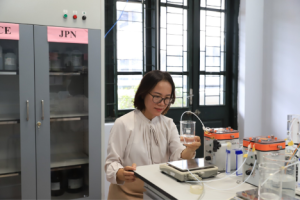
Related Research:
Hanoi City is currently undergoing rapid urbanization and population growth. The city’s water infrastructure is facing significant strain due to excessive exploitation, environmental pollution, urban inundation, and erratic flow patterns. Furthermore, the impacts of climate change are exacerbating these challenges, destabilizing water sources and altering the ecological dynamics of urban water bodies. Of particular concern is the urban river system, which, over years of urban development, has evolved into a crucial component of the urban drainage network. However, there is a looming risk of these waterways transforming into polluted conduits vulnerable to flow depletion during the rainy season. The research project “Restoration and Rehabilitation of Urban River Systems in Hanoi adapted to Urbanization and Climate Change in Hanoi City”. The project employs a holistic approach to address pressing issues, offering a scientific based framework for the establishment of a resilient urban water supply system. Such a system is designed to harmonize with socio-economic development imperatives, foster sustainability, and effectively mitigate the impacts of future climate change and urbanization. Specifically, the development of the urban river system is explored through a holistic approach, incorporating the principles of 3R solutions (reuse-recharge-recycling). This involves considering all water sources within urban river basin, including river water, rainwater, and treated wastewater, to recharge and sustain ecological flow. The project has proposed a number of technical and management solutions, including the development of specific projects to ensure the objectives of river pollution control, ecological restoration of river streams, and enhancing the role of the river system in connection with the environment, culture, and people of the capital city of Hanoi.
Relation to Climate Resilience and Adaptation Theme:
This project aims to reexamine the current urban river system in Hanoi and propose a new one adaptive and resilient to the future climate change. In the new system, river flow will be maintained by augmenting treated wastewater discharge, enhance the infiltration of rainwater and river water through riverbank revetments, riverside walkways, and structures on both sides of the river constructed from recycled construction waste materials with water infiltration capabilities. The amount of treated wastewater recharge have been estimated and optimized using the simulation modeling. The ability for storm water retention and regulations of the new system also evaluated according to climate change scenarios to ensure effectiveness in flooding prevention in the City. The project also applied decentralised wastewater technologies which developed by the applicants and her research group to manage wastewater for water reuse purposes in the areas where cannot connect to the city sewerage network. : innovative decentralized membrane bio reactor technology in urban city where the land area is limited, and improved and low cost filtration technologies using our filter media product (ECOBLOCK) from recycled construction and demolition waste (CDW) in peri-urban areas. These provide high efficiency in removing organic pollutants and nutrients from domestic wastewater stream, to provide high quality effluent for reuse purpose and resources recovery, aiming for an efficient and net-zero wastewater treatment facilities. The improved urban river system will help to maintain the sustainable urban hydrological water system by. As a result, we are pursuing urban water management strategies suitable for Hanoi city.
Affiliated Organisation:
Faculty of Environmental Engineering Hanoi University of Civil Engineering
